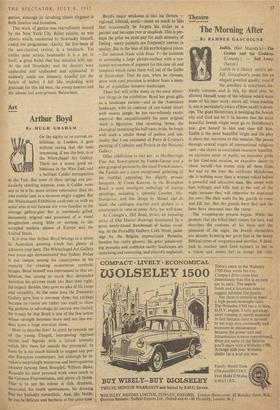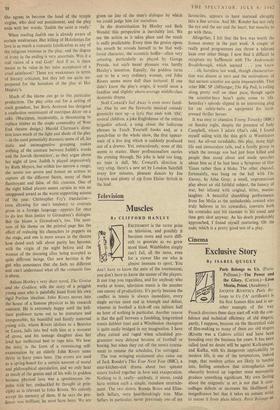Theatre
The Morning After
By BAMBER GASCOIGNE
Judith. (Her Majesty's.)—The Genius and the Goddess. (Comedy.) — Sail Away. (Savoy.) Judith is a library critic's pit- fall. Giraudoux's prose has an elegant jewelled quality, even if the jewellery is sometimes dis- tinctly costume, and in this, his third play, he allowed himself none of the whimsy which mars some of his later work; above all, when reading it, one is particularly aware of how neatly it devel- ops. The giant Holofernes is besieging the Jewish city and God has let it be known that the most beautiful Jewish virgin must go to Holofernes's tent, give herself to him and then kill him. Judith is the most beautiful virgin and the play is about her reactions to this mission. She passes through several stages of conventional religious cant—she shows in succession excessive humility, an excessive sense of purity, an excessive pride in her God-sent mission, an excessive desire to abase herself—but events strip all these from her and by the time she confronts Holofernes she is nothing more than a woman naked before a powerful and attractive man. She sleeps with him willingly and kills him at the end of the night because they will otherwise be separated for ever. She then waits for his guards to come and kill her. But the guards have fled and the Jews have swarmed into the camp.
The wrapping-up process begins. While she protests that she killed their enemy for love, and describes the coolness of his linen and the pleasures of the night, the Jewish chroniclers are already hymning her great feat in the heavy Biblical terms of vengeance and sacrifice. A dead- lock is reached until God appears to her in a vision and orders her to accept her role. She agrees to become the head of the temple virgins, who deal out punishment, and the play ends with her words; 'Judith the saint is ready.'
When reading Judith one is already aware of certain weaknesses. Her killing of Holofernes for love is as much a romantic falsification as any of the religious excesses in the play, and the degree of irony in the ending is very uncertain. Was it a real vision of a real God? And if so, is there meant to be value in her false acceptance of a cruel sainthood? These are weaknesses in terms of literary criticism, but they left me quite un- prepared for the boredom of the play at Her Majesty's.
Much of the blame can go to this particular production. The play cries out for a setting of stark grandeur, but Boris Aronson has designed a confection reminiscent of marzipan decor on a cake. (Marzipan, incidentally, is threatening to replace timber as the staple commodity of West End theatre design.) Harold Clurman's direc- tion loses much of the light and shade of the play —in the most potentially dramatic scene of all, his static and unimaginative grouping makes nothing of the contrast between Judith's words and the Jewish chroniclers', as they argue about her night of love. Judith is played impressively by Ruth Meyers, but within too narrow a range; she seems too severe and honest an actress to capture all the different facets, many of them flamboyant and false, of this creature. One of the eight billed players seems certain to win an unopposed award as the worst supporting actress of the year. Christopher Fry's translation— even allowing for one's tendency to overrate prose in a foreign language—appears for once to do less than justice to Giraudoux's dialogue. But the blame is Giraudoux's, too. The neat- ness of his theme on the printed page has the effect of reducing his characters to puppets on the stage, and one is more aware in the theatre how dated such talk about purity has become, with the virgin of the night before and the woman of the morning after being accepted as quite different beings. Our new heroine is the girl who announces that she feels no different and can't understand what all the romantic fuss is about.
Aldous Huxley's very short novel, The Genius and the Goddess, tells the story of a priggish young man who is painfully freed from his own rigid Puritan idealism. John Rivers moves into the house of a famous physicist as his research assistant. He is extremely happy until the bril- liant professor turns out to be immature and irresponsible, his beautiful and faintly maternal young wife, whom Rivers idolises as a Beatrice or Laura, falls into bed with him at a moment of stress, and his teenage daughter does her level but ineffectual best to rape him. We hear the story in the form of a reminiscing self- examination by an elderly John Rivers some thirty or forty years later. The events are used as a spring-board for a certain amount of moral and philosophical speculation, and we only hear as much of the genius and of his wife (a goddess because physical love was a spontaneous im- pulse with her, unshackled by thought or prin- ciple) as is relevant to John Rivers. We entirely accept his memory of them. If he says the pro- fessor was brilliant, he must have been. We arc given no line of the man's dialogue by which we could judge him for ourselves.
In the dramatisation by Huxley and Beth Wendel this perspective is inevitably lost. We see the action as it takes place and the result is sadly predictable. Every time the genius opens his mouth he reveals himself to be that well- loved character, the eccentric boffin—often very amusing, particularly as played by George Pravda, but such banal pleasure was hardly Huxley's intention. Equally, the goddess turns out to be a very ordinary woman, and John Rivers seems more dull than tortured. If one didn't know the play's origin, it would seem a familiar and slightly above-average middle-class domestic drama.
Noel Coward's Sail Away is even more famil- iar. One by one the favourite musical comedy gimmicks turn up—a lyric that ends with 'Ole,' several children, a joke Englishman of the retired brigadier school, a song about the ludicrous phrases in Teach Yourself books and, as a punch-line to the whole show, the first appear- ance of a live dog which is suddenly produced out of a drawer. Yet, miraculously, none of this seems to matter. Sheer professionalism carries the evening through. No joke is held too long, no tune is dull, Mr. Coward's direction is very crisp, there's a new set by Loudon Sainthill every few minutes, pleasant dances by Joe Layton and plenty of zip from Elaine Stritch in the lead.











































 Previous page
Previous page